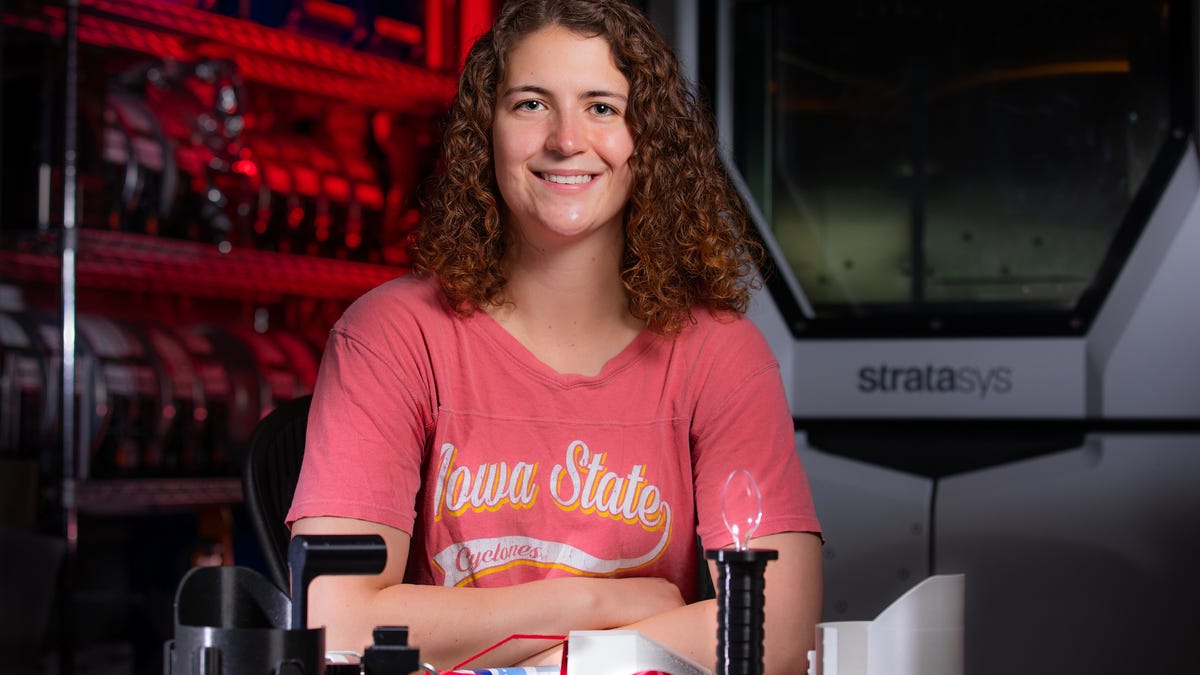Iowa
ISU graduate’s engineering expertise helps patients recover from brain injuries

For Cassandra Swacker, engineering is a way to help people.
Majoring in mechanical engineering and minoring in biomedical engineering at Iowa State University equipped Swacker with the skills to design and manufacture personalized utensils and devices for people with traumatic brain injuries.
Her quest to help others through engineering began while she was in high school, when she saw how a prosthetic leg changed her father’s life. She’ll graduate at the end of this semester, which concluded this week, and her engineering quest will continue as she begins her career developing innovative solutions in technology and manufacturing.
“Biomedical engineers need to be involved in all those things to understand the biology and anatomy components of how machines interact with people,” Swacker said. “They also need to understand the design and manufacturing processes of those machines.”
Improving lives through engineering
Swacker, an Urbandale native, witnessed the power of biomedical engineering when her father was diagnosed with ankylosing spondylitis, a type of arthritis that can affect the spine, knees, ankles and hips. The condition caused severe wear on her father’s ankle bones. He had metal plates implanted but eventually elected to have his leg amputated below the knee and replaced with a prosthetic.
The prosthetic improved her father’s mobility dramatically. Around the same time, Swacker took an engineering design course in high school, and she started thinking about how engineering affects people, including her father, in countless ways.
“My brain had that little lightbulb moment of, ‘oh, the people who are making prosthetics are engineers,” she said.
She discovered biomedical engineering, a fast-growing field that utilizes innovations in materials and technology to develop devices and equipment to enhance human and animal health.
“When he finally got his prosthetic and I was able to see just how big of an improvement it made for him, it was really inspiring and I wanted to be able to have that direct of an impact on peoples’ quality of life, which got me interested in the biomedical field,” Swacker said.
She enrolled at Iowa State because of the university’s strong engineering programs and proximity to family. She decided to major in mechanical engineering and pick up a minor in biomedical engineering.
Made-to-order medical devices
Swacker began her first year at Iowa State during in the fall of 2020, at a time when the pandemic forced most classes to be held remotely. The challenges of the pandemic taught her to work independently on her courses. They also helped her appreciate the classroom experience when in-person instruction resumed.
She landed an internship with Iowa State’s Center for Industrial Research and Service, which partners with business and communities across Iowa to develop tailored strategies to grow and prosper. In just the last five years, CIRAS and its partners have helped more than 4,600 businesses in every Iowa county, creating an economic impact of more than $3.1 billion.
Among the organizations helped by CIRAS is On With Life, an Ankeny-based rehabilitation clinic that helps patients recover from traumatic brain injuries and other neurological conditions. Swacker saw an opportunity with On With Life to apply what she was learning in her biomedical engineering courses.
Because brain injuries manifest a wide range of symptoms, On With Life’s patients often require personalized equipment and devices. 3D printing technology offers a way to create unique devices to precise specifications, so Swacker got to work familiarizing herself with the technology.
She custom-built eating utensils, such as plate covers and silverware handles, for patients whose injuries affected their fine motor skills. The adaptive plate cover she developed clips onto the top of a plate with strategically placed gaps that expose only a portion of the food. This helped a patient whose brain injury caused a compulsion to eat too fast to slow down to a healthier pace.
On With Life CEO Jean Shelton praised Swacker’s work.
“Brain injury rehabilitation calls for an individualized approach to services,” Shelton said. “No one brain injury is like another due to the many functional areas of the brain. We are grateful for Cassie’s work as she was able to address a very specific need through technology that aids an individual and their family to manage impulse control related to food. The plate she created allowed for a balanced meal approach without the visual distraction of the other foods on the plate. The plate is still in use!”
Swacker even developed an eye for aesthetics in her 3D printing designs. She learned one particular patient, who was a fan of Harley Davidson motorcycles, didn’t like the way some of the specialized eating utensils looked. So she designed one to resemble the handlebar of a motorcycle, complete with a flame finish. Many of her designs got rave reviews from the end users, she said.
Her work with CIRAS and On With Life taught her numerous lessons about engineering design, utilizing cutting edge technology and problem solving.
In the months ahead, Swacker said she plans to move to the Iowa City area to pursue a career in manufacturing engineering. She said she’ll apply all the lessons she learned studying at Iowa State and working for On With Life as she begins her career, lessons like never hesitating to ask questions and forging relationships with the people she’s working with.
Perhaps most importantly, she’ll launch her career with firsthand knowledge that good engineering can help people and change lives.

Iowa
Midwives’ lawsuit challenging Iowa certificate-of-need law can continue, judge says

A pair of central Iowa midwives fighting for the right to build a stand-alone birthing center can continue their lawsuit against the state, a federal court ruled Wednesday.
Caitlin Hainley and Emily Zambrano-Andrews, who together make up the Des Moines Midwife Collective, are challenging a state law requiring any new medical facility obtain a “certificate of need” from regulators. That involves, among other expensive and time-consuming steps, giving any potential competitor notice of the proposal and the opportunity to argue why the new facility is not truly needed.
Hainley and Zambrano-Andrews, who currently provide home birth services throughout the Des Moines metro, want to open a birth center with tubs and other equipment so patients can give birth in a home-like setting. Their attorneys say that midwife service, whether at home or a birth center, is fundamentally different than that provided by hospital maternity wards. Their lawsuit, filed in February 2023, argues it is unconstitutional for the state to grant what amounts to a “competitor’s veto” to established businesses.
The state filed to dismiss the lawsuit. Wednesday’s ruling, by Chief District Judge Stephanie Rose, largely denies that motion. But Rose did rule the certificate of need law does not infringe on any “fundamental right” under the U.S. Constitution, meaning it will be easier for the state to prove its law is constitutional.
From 2023: MercyOne Des Moines to shut down its midwives program. What that means for pregnant moms:
The Iowa Attorney General’s Office did not respond to a message seeking comment. Wilson Freeman, an attorney with the libertarian-leaning Pacific Legal Foundation who is representing the midwives, said in an email they believe they will prevail even if the court does not agree the law infringes on their fundamental rights.
Strict scrutiny or rational basis?
Any law that burdens what courts consider to be a fundamental right — such as freedom of speech, the right to marry and have children, and more — must survive what is known as strict scrutiny, meaning it must be found to be “narrowly tailored” to serve a “compelling” government interest.
If a law does not implicate a fundamental right, courts instead apply what is known as rational basis review, meaning the law must only be “rationally related” to a “legitimate” government interest.
In this case, the midwives argued the certificate of need law violated multiple fundamental rights, including the right of mothers to choose their place and manner of giving birth and the right of the plaintiffs to earn their living. But the judge rejected those claims, finding other courts have declined to make birth setting a fundamental right and noting the U.S. Supreme Court’s “unmistakable resistance” to recognizing additional rights as fundamental.
Case can continue, judge rules
Attorneys for the state had asked for the case to be dismissed entirely, but Rose refused, finding the plaintiffs have “plausibly” argued the certificate of need law might fail even under rational basis review.
Among other arguments, Rose noted that the midwives raise the question of why they are allowed to provide home births without a certificate of need, but do need a certificate to provide the same service in a centralized location. Such a distinction does not improve the cost, availability or quality of maternal care, the women argue. Rose wrote the women have asserted a “plausible claim for relief” that the law lacks a rational basis, and agreed the lawsuit should continue.
Previously: Iowa finally passed a law to license midwives. Will it help sway medical field doubters?
Freeman, representing the midwives, told the Register they’re prepared to fight that fight.
“There is no rational reason for the state to require a certificate of need for midwives who want to help women give birth in a dedicated facility, while allowing midwives to attend births literally anywhere else without such a certificate, Freeman said. “While we continue to believe a fundamental right is implicated by the regulation, the law is unconstitutional under either standard.”
And although rational basis review is favorable to the state, similar laws have failed that test before, Freeman said. A Kentucky law requiring a certificate of need for moving companies was struck down under rational basis in 2014.
The case currently is scheduled for a bench trial before Rose in January 2025.
William Morris covers courts for the Des Moines Register. He can be contacted at wrmorris2@registermedia.com or 715-573-8166.
Iowa
Iowa Co. Sheriff’s Office asking for public help in locating missing 10-year-old

MADISON, Wis. (WMTV) – The Iowa County Sheriff’s Office is asking for the public’s help Friday night in locating a missing 10-year-old.
The sheriff’s office says 10-year-old Roseame Doyle has been missing since 6 p.m. and was last seen wearing an olive green shirt.
An Iowa County Emergency Management alert says she was last seen walking south from a residence in Hollandale. Doyle stands 4′5 tall, has brown shoulder length hair and blue eyes.
ICEM also noted that Doyle had a brown flowered backpack and paint on her face.
The sheriff’s office asks that anyone with information to call 608-930-9500.
Click here to download the WMTV15 News app or our WMTV15 First Alert weather app.
Copyright 2024 WMTV. All rights reserved.
Iowa
Iowa attorney general resumes funding of Plan B for rape victims, but not abortions • Iowa Capital Dispatch

Iowa Attorney General Brenna Bird announced Friday that her office will reinstate payments for emergency contraceptives, like Plan B, for victims of sexual assault and rape, but will no longer reimburse victims for abortions.
The announcement marks the end of the “full audit of victims services” announced by Bird shortly after winning the 2022 election against former Attorney General Tom Miller, the Democrat who held the office for 40 years.
That review involved the suspension of state payments for emergency contraception – and in rare cases, abortion – for victims of rape. The state’s Sexual Assault Examination Payment Program gave reimbursements to providers for these medical services through the Iowa Victim’s Restitution Fund, fees collected from people convicted of crimes.
That review involved the suspension of state payments for emergency contraception – and in rare cases, abortion – for victims of rape. The AG’s office formerly paid for these services through Iowa’s victim restitution fund, fees collected from people convicted of crimes. Bird said that while there is no state law requiring the practice of paying for these treatments, she said she would reinstate part of the payment program moving forward.
“I agree that Plan B contraceptive prescriptions for victims to prevent pregnancy should be reimbursed,” Bird said at the news conference. “The office will reimburse all pending victim claims for Plan B contraceptives and continue reimbursing providers moving forward. However, Iowa will not use public dollars to pay for abortions.”
The announcement ends the pause on payments for emergency contraceptives — meaning roughly 400 pending reimbursement requests from the review period will be paid, Bird said. She also emphasized that while the payment program was halted, no victims were denied or delayed in getting services because of the review.
She also said that during this period, there was only one reimbursement request through the AG’s office for an abortion. This request will be denied.
Bird, an outspoken abortion opponent, had faced months of criticism from Democrats and reproductive health advocates for the long process in finalizing the review and announcing whether the reimbursements would be reinstated.
Auditor Rob Sand, the only Democrat to currently hold statewide elected office in Iowa, said during a news conference in March that Bird was attempting to avoid “accountability” for pausing payments for sexual assault and rape victim services by categorizing the review as an “audit.” Neither the auditor’s office nor a third party conducted a review of victims’ services for the AG’s office, he said — adding that if an audit was happening, payments would not need to be paused.
“Every city, every county, every school district in the entire state of Iowa gets an audit every year,” Sand said. “None of them have ever suspended business while waiting for their audit to get completed. This is a policy decision the attorney general made.”
In a news release Friday, Sand reiterated this point and said there was no justification provided for the need to cease reimbursements.
“For a year, Iowa’s Attorney General inflicted even more trauma on rape victims just for politics,” Sand said in the statement. “We know because her report doesn’t provide a single legal or financial reason to have withheld payments for emergency contraception.”
Mazie Stilwell with the Planned Parenthood Advocates of Iowa said Bird’s decision to pause payments was unnecessary, and turned hundreds of sexual assault survivors “into political pawns.”
“Politicizing sexual assault survivors is absolutely reprehensible and sickening,” Stilwell said in a news release. “These are real people who are vulnerable and deserve to be treated with dignity and respect. Although state-paid emergency contraceptives will resume, those in need of abortion care will now have to shoulder the cost. This is the last thing survivors should have to worry about. It’s not right, and we must demand better from the people elected to represent us.”
Bird said the office encountered “some roadblocks” in the process of making the review and report, including problems involving missing documents or having to reconstruct certain grants. She thanked John Gish, section chief for the Victim Assistance Section at the office for taking on much of the work involved in the process.
In addition to the emergency contraceptives decision, Bird plans to make or request several changes based on the audit. These recommendations include raising pay for certified sexual assault nurse examiners from $200 to $400 per exam, the first increase since 2005, in addition to providing transportation reimbursement for trained nurses to travel for conducting exams.
Bird said these measures could ease problems caused by the shortage of nursing staff across the state. There are roughly 470 sexual assault nurse examiners currently certified in Iowa, Bird said, adding that she believed the steps would both better compensate nurses and ensure victims do not encounter long wait times.
“We do not want someone who’s going to a hospital to report an assault to go away without an exam,” she said. “They might not come back, or key evidence might be lost. We know of at least one victim who waited more than eight hours at a Polk County hospital before seeing a sexual assault nurse. Victims deserve immediate care, and our heroes in nursing deserve our support.”
Other measures include restarting notification services required by state law for victims of sexual assault and domestic abuse. The system was eliminated under Miller in 2019, Bird said, and the office is working to create a new system. The service, working with Iowa’s judicial and prison systems, would send victims a text message or other message when a requested protective order has been issued, and 30 days before it expires.
While the new system is not up yet, Bird said she hired a coordinator to build the new system.
Bird also said the office is fixing problems with the Iowa Victim Notification System, a currently operational program that notifies victims when their abusers are released from custody. The review found that the current notifications are often inaccurate, telling victims that a person had been released from custody when they were being transported between different facilities, like county jail and state prison.
“Victims have already been through enough and shouldn’t be scared by false notifications,” Bird said. “We worked with our partners to correct the messages and to keep victims informed about the perpetrator’s status.”
In addition to state-level changes, Bird also repeated her call for the federal government to stop a discussed cut of victim services funding provided through the Victims of Crime Act (VOCA). Iowa receives roughly $5.5 million in VOCA funding each year for a variety of victim services — 42%, more than $2.3 million, of which would be cut if Congress does not act, she said.
“That cut, if it’s allowed to happen, will go through to the advocacy agencies that we have all across the state serving victims,” she said. “It will cause personnel cuts, it will mean less support for victims, especially in rural Iowa. It will mean fewer resources for healing.”
-

 News1 week ago
News1 week agoRead the I.C.J. Ruling on Israel’s Rafah Offensive
-

 World1 week ago
World1 week ago€440k frozen in Italy over suspect scam by fake farmers
-

 News1 week ago
News1 week agoVideo: Protesters Take Over U.C.L.A. Building
-

 World1 week ago
World1 week agoHoping to pave pathway to peace, Norway to recognise Palestinian statehood
-

 News1 week ago
News1 week agoLegendary U.S. World War II submarine located 3,000 feet underwater off the Philippines
-

 Politics1 week ago
Politics1 week agoNYC Mayor Eric Adams announces Urban Rat Summit to combat rodent crisis: 'I hate rats'
-

 Politics1 week ago
Politics1 week agoAOC demands Senate Democrats investigate reports of Jan. 6 flags flown at Supreme Court Justice Alito's home
-

 Science1 week ago
Science1 week agoSecond human case of bird flu detected in Michigan dairy worker



















